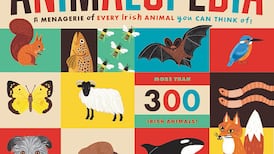The Irish Times Book Club's study of Blue is the Night began with Eoin McNamee reflecting on a photograph of Patricia Curran which has captivated him. It concludes here with the author writing about another photograph charged with significance for him, of his mother and solicitor father in their prime oblivious to the fate set to befall them and the North.
A photograph of my father and mother. Taken in the Slieve Donard hotel in Newcastle in the late 1950s. They’re wearing evening dress. My mother in a silk dress she made from a pattern in Vogue magazine. My father in black tie, hair combed back, a cigarette in his right hand. The gifted young lawyer and his art teacher bride. The man who fell from grace.
There were moments of brilliance and episodes of unforgiveable darkness. That’s all there is to say here. You either tell all of a life like that or you tell none of it.
The Blue trilogy has Judge Lancelot Curran at its centre. Three women. Three murders in the postwar shadows. Curran started out as an idealistic young prosecutor and became the judge who sent a man to the gallows with a nod and a wink to the jury, who stands accused of covering up the murder of his own daughter. There is a temptation to look for parallels. How idealism doesn’t survive contact with a corrupt system, that kind of thing. What if the accused is innocent and the judge is guilty?
But nothing in these books is about revisiting the past in the hope of finding an explanation of why a life goes wrong. Redemption isn’t the work of a writer. Not this one anyway. What you do get is a terrain and a reason to be there. To prowl the boundaries of Lance Curran’s shadowland. The high class clubs and low class assignations. The gambling and transgressive sex.
The things that are less a backdrop to a life than a void into which it empties.
And you get the tools to explore it. You learn to distrust. You learn what people are capable of. You learn that there are places in the world where no light falls. None of it is good but you learn that you must acknowledge beauty when you see it, and accept consolation where you find it.
These are the gifts handed on to the sons of vivid men. If you want them.
If you’re able for them.
And you know the faces. You’ve seen them before. The lonesome cavalcade of dodgy lawyers, bent policemen, fraudsters, lost girls. People dragging their own doom around with them, consumed by sins of their own devising.
They demand to be told as they are, not as fictional constructions. That might be a failing as a writer but it doesn’t feel like one. To call them by their given names seems a better option than fitting them up with an alias.
There’s enough of that around.
But everyone is entitled to moments of unchallenged grace in their lives.
To look the future in the eye and have the courage to call its bluff. To put judgement on hold when it’s after midnight in a once-fashionable hotel, and the glamour and the ambition fit like a well-cut dinner jacket, or a silk dress from Vogue.











